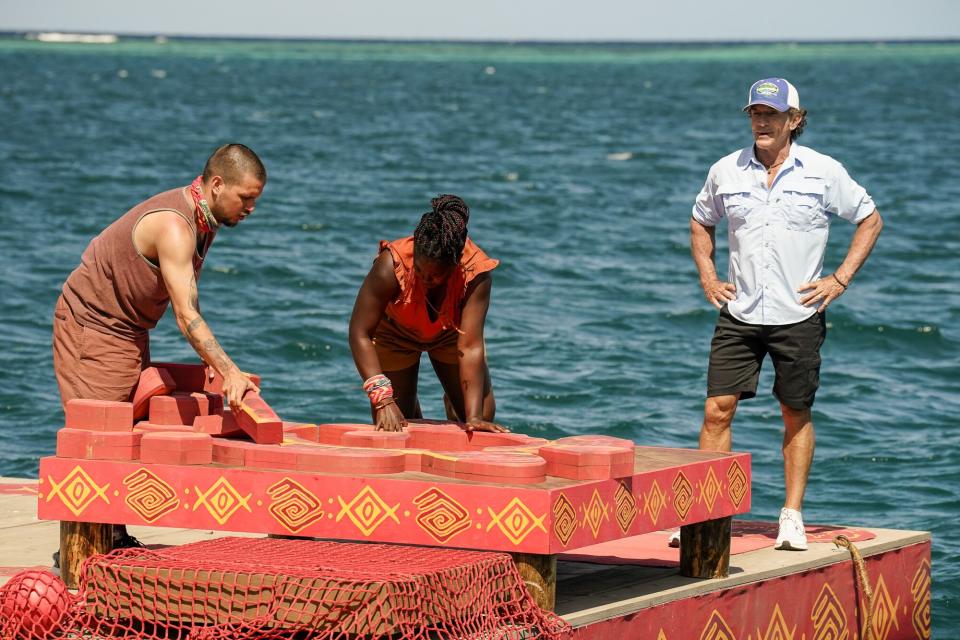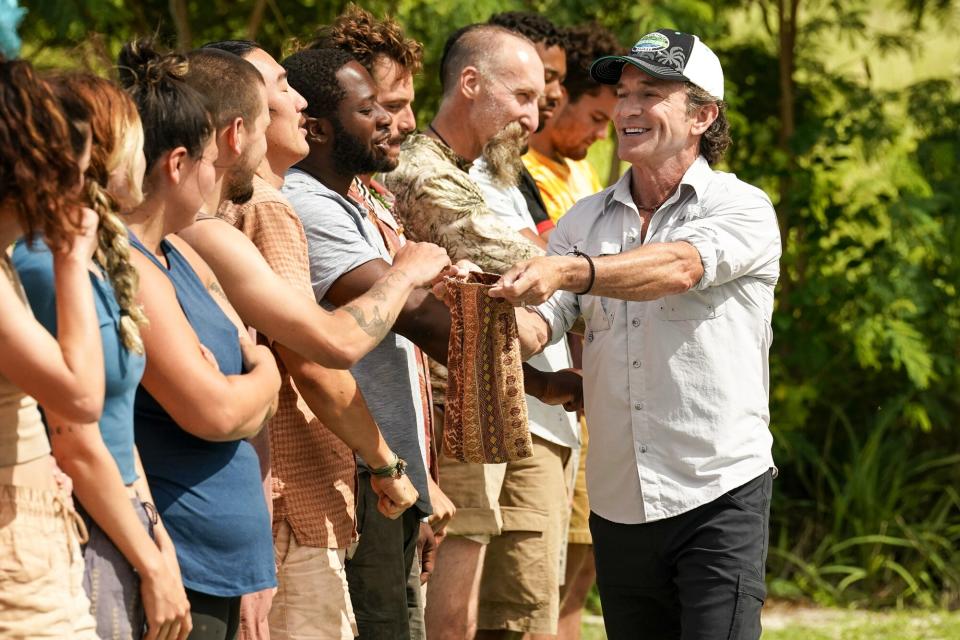Jeff Probst says the days of automatic Survivor merges are over
- Oops!Something went wrong.Please try again later.
- Oops!Something went wrong.Please try again later.
When Survivor emerged from its extended COVID-19 hiatus, the show was more chaotic than ever — and that was intentional. Even before the global pandemic came around, host and executive producer Jeff Probst saw the season 40 Winners at War installment, which pitted champions from the first two decades against each other, as the end of an era, with season 41 as the start of a new phase for the franchise.
That meant trying out a bevy of new twists, tweaks, and wrinkles, and doing so in a newly condensed 26-day format — shaving off one-third of the season. As a result, Survivor 41 and Survivor 42 (which used essentially the same creative elements) were experiments of a sort. Producers decided to try a lot new things and then see what worked moving forward. We are now seeing the results of that experimentation on Survivor 43.

Robert Voets/CBS Jeff Probst on 'Survivor 43'
The perfect illustration of that approach is the evolution of the merge process. Last year, producers decided to make a change where all the players would compete in a challenge, and the winners would automatically make the merge, while the losers would be vulnerable at one more Tribal Council before the merge was official for all. It was an exciting switch that upheld the integrity of the game while also providing interesting new dynamics with only half the tribe being eligible to be voted out.
Unfortunately, there was one other step involving the implementation of a highly controversial hourglass twist that enabled one player to reverse the results of the challenge. Thankfully, after the hourglass proved unpopular with both fans and players, producers ditched it for the current season, settling on the far more intriguing first half of the change, with players still battling to receive their fancy new buff.
And according to Probst, it is a change that is here to stay. The host and EP spoke to EW at the halfway point of the season, weighing in on the merge 2.0, giving his take on the big bag search, and explaining why 90 minutes is "a great length for a Survivor episode."

Robert Voets/CBS Jeff Probst on 'Survivor 43'
ENTERTAINMENT WEEKLY: The network gave you three and a half hours over your first two episodes this season, which enabled you to introduce the entire cast very quickly. I know it's all about the CBS programming schedule and how much time they can spare with all their other big shows, but is this extra time the sort of thing you lobby for as an executive producer? And if so, what are those discussions like?
JEFF PROBST: I love when you ask questions like this because it gives our audience insight into different aspects of what it takes to produce our show, and that makes me happy. Yes, I'm definitely involved, and yes, I'm almost always asking for more time because we have so much material we want to put in our show!
Here's the lowdown. Because we are a CBS show, we are limited to a specific running time, which is roughly 42 minutes. That's the big difference between a traditional network and a streaming service. Streamers don't have the same limitations, so one episode might be 45 minutes and the next episode could be 56 minutes. It doesn't matter. So even though you can watch Survivor episodes on Paramount +, the running time will still be 42 minutes.
That means you often have to cut scenes that are really good but don't connect directly to the main story, which is always "Who will be voted out tonight?" So whenever you hear a player being frustrated that their funny joke didn't make the cut, it's not because it wasn't funny, it's only because we just didn't have enough time.
Our premiere was always scheduled for two hours and that's significant, because you really need to know in advance so you can build the episode accordingly. It was the same thing for episode 2, as CBS wanted to pair us with Amazing Race to do a three-hour block, so we both did 90 minutes.
I actually think 90 minutes is a great length for a Survivor episode. It means basically 63 minutes of total running time, and that's similar to what you would find on a streaming service. But as producers, we need to know in advance so we can structure our creative ideas to accommodate the additional time.
Fortunately, we have an incredibly tight relationship with CBS and that allows us to talk candidly about stuff like this and do what is best for the show. That's always the priority. I've talked to a lot of other producers on different shows and their stories always make me appreciate what we have with CBS.

Robert Voets/CBS Jesse Lopez, Nneka Ejere, and Jeff Probst on 'Survivor' 43
You were out there on the scene when it happened, so what was your reaction when the Vesi tribe started blatantly helping Baka on the puzzle so they could beat Coco? In the moment, were you thinking that was a smart move to help even out the numbers a bit, or a dangerous move to risk making enemies heading into an eventual merge?
It's an interesting situation for me, because as it's happening, I'm actually not editorializing at all. There are too many other things I need to focus on, so all I'm doing is commenting on what I'm seeing in real time. Zero thoughts about whether it's good or bad, and there is so much chaos that I wouldn't even know how Coco was reacting to it.
Then when the challenge is over, I quickly sort back over any highlights and decide what to bring up for discussion. Had Vesi been secretly helping Baka, then I never would have brought it up. But because it was so public and so obvious, it's fair for me to talk about it.
As for whether it is ultimately good or bad, I don't spend much time on that because it's pure speculation and ultimately unimportant to me. It's their game. But if I was watching at home, I would definitely have a lot of opinions! It's one of the best parts of being a fan, you get to second-guess everything!
There has been so much drama this season about the search through Gabler's bag. What do you make of Jeanine and Elie's decision to go through it, as well as Gabler's reaction of telling everybody about it at the challenge winners' feast?
This connects me back to something you used to write about in this same column years ago! You would hear me say, "In order to win this game, you have to be willing to make big moves." You would then write something clever about "Probst just wants big moves for his show! Don't fall for it!" So I'm going to say the exact same thing again in a different way. You can't win this game by playing to not lose. You can't win by playing safe. You can't win by being afraid to take a risk. Sure, you could get to the final three, but you won't get a single vote.
If you want to have a shot to win, you have to play a game that your jury will respect. Sneaking through the bag of another player is a big move. You're seeking information that might give you an edge when it comes to the vote. That's playing the game. Of course, it can backfire if you get caught — that's why it's a big move. Likewise, Gabler had a decision to make: Do I keep this information to myself, or do I use it to try and sabotage Elie's game? He went big. It could have backfired on him if he was seen as stirring up trouble. But you have to take the risk. I'm 100 percent on this feeling of playing to win vs. playing to not lose.

Robert Voets/CBS Jeff Probst and the cast of 'Survivor 43'
While I was not a fan of the hourglass twist, I always liked the idea of splitting everyone up into two teams and having people battle to get into the merge, which is what you did here for Survivor 43. Do you think this, or something like this, will become a regular part of Survivor seasons to come, as opposed to an automatic merge?
You nailed it. The most important idea of the new merge is that you must earn it. That's one of the core principles of this new era of Survivor. In the past you "made" the merge, but now you "earn" the merge. It's the same for every layer of the game. There are very few rewards, there are penalties for losing, and there is an emphasis on earning it every step of the way. So yes, count on this being the new merge moving forward.
You mentioned before the season that there would be some really big builds on the challenges, and we certainly saw that, along with some fresh new elements. What about now heading into the post-merge part of the game, which typically has smaller, stationary tests of balance or endurance? What can we expect to see coming up?
During the tribe phase, our challenges are designed to force a tribe to work together, and in doing so highlight who contributes and who is a liability. This information is then factored into all the other layers of the game, like who helps at camp, who is loyal in an alliance, who might have an idol or advantage. Then when you go to Tribal, you factor all of this into your decision.
So the challenges have been getting bigger and more difficult, with the understanding that how you perform in a challenge is merely one of the elements that goes into deciding who you keep and who you vote out of the game.
Once we merge, we shift our focus to creating challenges that are as fair as possible for all players, regardless of age or physical abilities. There are of course lots of variables and some challenges favor different types of skills, but the idea is that on any given day, any player can win. And you see it happen all the time — someone surprises themselves by winning individual immunity and getting to wear the necklace.
Finally, hit us up with a big tease for the back half of the season.
These are always tough for me to do, so here's what I can offer. Gameplay gets more intense, moves become even more calculated, and once again, the great players step up and make… big moves!
Sign up for Entertainment Weekly's free daily newsletter to get breaking TV news, exclusive first looks, recaps, reviews, interviews with your favorite stars, and more.
Related content:
Elie Scott told Jeanine not to use the immunity idol on Survivor 43
Survivor players makes crucial merge mistake in deleted scene
Lindsay Carmine says there was Survivor gaslighting going on
Jeff Probst talks possible Survivor international showdown season
Nneka Ejere reveals what happened after being voted off Survivor
Danny McCray feels vindicated by removal of Survivor hourglass twist

